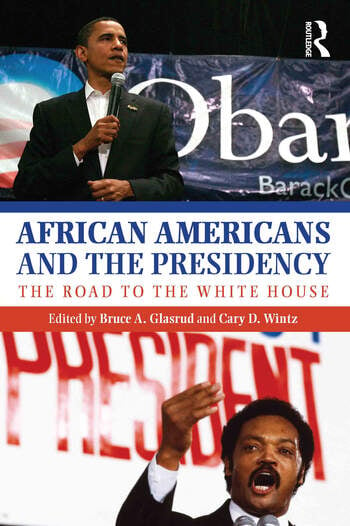African Americans and the Presidency: The Road to the White HousePosted in Anthologies, Barack Obama, Books, History, Media Archive, Politics/Public Policy, United States on 2013-02-11 18:53Z by Steven |
African Americans and the Presidency: The Road to the White House
Routledge
2009-11-25
256 pages
Paperback ISBN: 978-0-415-80392-2
Hardback ISBN: 978-0-415-80391-5
eBook ISBN: 978-0-203-86433-3
Edited by:
Bruce A. Glasrud, Professor Emeritus of History
California State University, East Bay
Cary D. Wintz, Distinguished Professor of History and Geography
Texas Southern University
African Americans and the Presidency explores the long history of African American candidates for President and Vice President, examining the impact of each candidate on the American public, as well as the contribution they all made toward advancing racial equality in America. Each chapter takes the story one step further in time, through original essays written by top experts, giving depth to these inspiring candidates, some of whom are familiar to everyone, and some whose stories may be new.
Presented with illustrations and a detailed timeline, African Americans and the Presidency provides anyone interested in African American history and politics with a unique perspective on the path carved by the predecessors of Barack Obama, and the meaning their efforts had for the United States.
Contents
- Introduction: The African American Quest for the Presidency / Bruce A. Glasrud and Cary D. Wintz
- 1. Beginning the Trek—Douglass, Bruce, Black Conventions, Independent Political Parties / Bruce A. Glasrud
- 2. The Communist Party of the United States and African American Political Candidates / David Cullen and Kyle G. Wilkison
- 3. Charlotta A. Bass—Win Or Lose, We Win / Carolyn Wedin
- 4. Shirley Chisholm—A Catalyst for Change / Maxine D. Jones
- 5. The Socialist Workers Party and African Americans / Dwonna Naomi Goldstone
- 6. Civil Rights Activists and the Reach for Political Power / Jean Van Delinder
- 7. Jesse Jackson—Run, Jesse, Run! / James M. Smallwood
- 8. Lenora Branch Fulani—Challenging the Rules of the Game / Omar H. Ali
- 9. Race Activists and Fringe Parties with a Message / Charles Orson Cook
- 10. Black Politicians—Paving the Way / Hanes Walton, Jr., Josephine A. V. Allen, Sherman C. Puckett, and Donald R. Deskins, Jr.
- 11. Colin Powell—The Candidate Who wasn’t / Cary D. Wintz
- 12. Barack Hussein Obama—An Inspiration of Hope, an Agent for Change / Paul Finkelman
- Blacks and the Presidency: A Selected Bibliography
Introduction: The African American Quest for the Presidency
Forty years ago (1968), the African American political scene began to change dramatically, the culmination of Supreme Court decisions such as Smith vs. Allwright, Baker vs. Carr, and Terry vs. Adams; amendments to the United States Constitution including the fourteenth, fifteenth, nineteenth, and twenty-fourth; federal legislation, especially the Civil Rights Act (1964) and Voting Rights Act (1965); and determined black leaders and voters. African Americans as never before voted and contended for national office. Some white liberals abetted and encouraged the metamorphoses. All was not well, however. Civil rights leader and black activist Martin Luther King, Jr. was assassinated while leading a reform effort in Memphis, Tennessee. Two months later, while completing a primary election victory in California, Democratic senator Robert F. Kennedy, a white proponent of black rights, was assassinated. Perhaps propelled by these losses on the national scene, African American men and women participated in the national political process as delegates and voters, both vital steps, and also as nominees and candidates.
A few years before, while serving as Attorney General of the United States for his brother, John F. Kennedy, Robert Kennedy asserted that the United States could have a black president within forty years. As Kennedy phrased it, “in the next forty years a Negro can achieve the same position that my brother has.” From the perspective of 2008 Kennedy’s prescience is remarkable. Forty years after the assassinations of King and Kennedy, an African American, Senator Barack Obama, was the Democratic Party’s nominee for the presidency. By mid-September most polls suggested that he was the front-runner to be elected president of the United States, and in November Obama was elected the forty-fourth president of the United States. President Obama was not the first African American to seriously pursue the presidency. In fact, more than forty black men and women candidates paved the way for a black president; Obama stands on the shoulders of those other black leaders and politicians…
Read the entire Introduction here.

